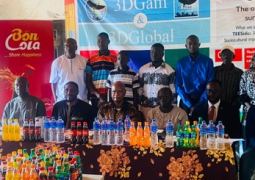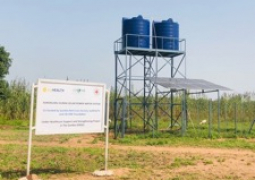
The announcement was made at the end of the two-day high-level Summit on Nutrition for Growth held in Paris, France. The summit was organised by the Ministry for Europe and Foreign Affairs under the auspices of the Minister Delegate for Francophonie and International Partnerships Thani Mohamed-Soilihi. The international community made ambitious commitments to tackle the challenge of malnutrition in all its forms.
According to a press release issued at the end of the summit, a close to US$28 billion in nutrition funding to reach Sustainable Development Goals was announced, attesting to the exceptional degree of mobilisation and renewed commitment to multilateralism.
In total, the international community’s financial commitments in support of nutrition represent US$27.55 billion dollars.
The Summit Chair’s final declaration helped reaffirm a shared commitment to global nutrition.
The summit was attended by 127 delegations, including governments of 106 countries, in addition to numerous international organisations, civil society organisations, development banks, philanthropic organisations, research institutions, and businesses who met together to help put an end to this scourge, which hinders countries’ economic and social development and traps communities in an intergenerational cycle of poverty.
Over 400 commitments were registered on the Nutrition Accountability Framework platform.
The release further revealed that France’s commitment to continuing its efforts in support of nutrition and, between now and 2030, plans to invest €750 million in projects supported by the French Development Agency in particular, as well as in the Ministry for Europe and Foreign Affairs’ food aid programs.
In addition, France also announced that it will be boosting food sustainability education, promoting the prevention and early identification of malnutrition, and improving the nutritional quality of food supply at the national level.
Thani Mohamed-Soilihi, Minister Delegate for Francophonie and International Partnerships, explains: “This summit is a collective success for France and the international community, whose vigorous efforts have demonstrated their commitment to tackling the challenge of malnutrition.”
“That is the strength of multilateralism: the ability to tackle challenges that know no boundaries. Malnutrition has a particularly harmful impact on young children and pregnant and breastfeeding women. We cannot look away when one out of every two children under the age of five dies from malnutrition,” he declared.
He added that “proper nutrition is a challenge shared by all of our societies. It is the key to unlocking a shared, more prosperous future. This summit is not limited to financial investments; it also provides for innovative, effective investments that will have a lasting impact on development.”
Further, the European Union in particular mobilised its efforts, committing a total of €6.5 billion to fight malnutrition, of which €3.4 billion was allocated by the European Commission.
Other countries, including Madagascar, Côte d’Ivoire, Guatemala and Bangladesh also made noteworthy political and financial commitments to tackling the burden of malnutrition in their countries.
The Development Banks also mobilised their efforts, particularly the World Bank and the African Development Bank, which pledged US$5 billion and US$9.5 billion respectively until 2030.
Lastly, philanthropic organisations, civil society organisations and the private sectors account for a substantial share of financial commitments and philanthropic organisations will raise more than US$2 billion in the coming years to combat malnutrition.
One of the Summit’s highlights was the adoption of a youth declaration calling for young people to play a greater role in decision-making in order to promote the voices of the communities most affected by malnutrition.
Additionally, the press release revealed that nutrition enables all individuals to achieve their full potential, but all countries are facing at least one type of malnutrition, whose cost to the global economy is estimated at US$41 trillion over the coming decade.
In an uncertain international climate, the Summit helped refocus public policy on nutrition through ambitious commitments to transform the lives of millions of people worldwide.
The document revealed that by investing in nutrition, stakeholders have opted to support policies that have a positive impact on health, social protections, gender equality, the sustainability of food systems, climate and education. Nutrition is a particularly effective choice because on average, each euro invested in this area creates 23 euros in wealth.
On his part, Lamin Jarsey, Executive Director of Gunjur Conservationists and Eco Tourism Association, said the knowledge gap in environmental activism in Gambia is very wide. “Thus, when you have an opportunity of working with an organization that builds the capacity of young people, those who are into activism work, that's a plus. Greenpeace work very hard to maintain and protect our biodiversity in both marine environment and terrestrial environment,” he added.
He made reference to the fact that with a lot of the places that are under serious threat in the Gambia by either individual or even government itself, it is the civil society that blows the whistle to say, this is not right.
Thus, he said, their capacities need to be developed to help us better in our fight against environmental crimes.
Read Other Articles In National News

3DGam & 3DGlobal clocks 7 years with positive interventions in Gambia
Oct 1, 2024, 11:00 AM




